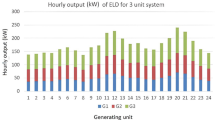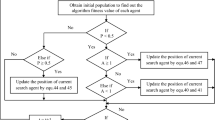Abstract
Emission levels play a crucial role for the thermal power companies to limit their flue gas in the competitive market. Realistic power bidding optimizations demand the responsibility of power regulators for searching of the optimal power bidding from economic emission aspect. Different discrete bidding situations have been analyzed in this attempt when a number of thermal power generating utilities demand bidding price at different percentages of their respective marginal price. These utilities compete among themselves not only for gaining maximum profit, but also they are made bound here to offer energy price along with flue gas emission level as minimum as possible. Pareto optimization has been searched by establishing Nash equilibrium of Game Theory considering minimum total objective of fuel cost and flue gas emission from the consumers’ aspect along with maximum profit gain for the power bidders. These multi-objective optimization results show that at economic and environmentally constrained situations, power bidders can earn more profit not only at optimally higher bidding price, but also at optimally lower bidding price along with selling higher quantity of electricity. Those bidders who bid at optimally lower marginal price along with selling lower quantity of electricity to satisfy minimum total objective are found suffering loss. Overall study shows that cost functions and emission functions as well as marginal prices of respective units play important role in different environmentally constrained bidding situations. An Indian Utility of 62 buses has been used for study, and program code is written in MATLAB R2013b platform.





Similar content being viewed by others
References
Aggarwal M, Bhaskar U (17th November, 2017) Thermal power plant may dodge new emission norms: report. https://www.livemint.com
Alrashidi MR, Hawary ME (2008) Impact of loading conditions on the emission economic dispatch. Int J Electr Comput Energ Electron Commun Eng 2(3):369–372. https://doi.org/10.1999/1307-6892/5966
Anderson JA (2009) Electricity restructuring: review of efforts around the world & consumer response. Electr J 22(3):70–86. https://doi.org/10.1016/j.tej.2009.02.017
Bagheri MN, Nasiri M, Mousavi SM (2011) An appropriate multiple criteria decision making method for solving electricity planning problems, addressing sustainability issue. Int J Environ Sci Technol 8(3):605–620. https://doi.org/10.1007/BF03326246
Barroso LA, Carneiro RD, Granville S, Pereira MV (2006) Nash equilibrium in strategic bidding: a binary expansion approach. IEEE Trans Power Syst 21(2):629–638. https://doi.org/10.1109/TPWRS.2006.873127
Bhattacharya K, Bollen M, Daalder JE (2001) Operation of restructured power systems. The Kluwer Academic Publishers, New York. https://doi.org/10.1007/978-1-4615-1465-7
Borenstein S, Brushnell J (2000) Electricity restructuring: deregulation or reregulation? Energy 23(2):46–52
Chang YC, Yang WT, Liu CC (1994) A new method for calculating loss coefficients. IEEE Trans Power Syst 9(3):1665–1670
Chatain O (2014) Cooperative and non-cooperative game theory. https://works.bepress.com/olivier_chatain/9/. Accessed 08 Aug 2018
Christie RD, Wollenberg BF, Wangensteen I (2000) Transmission management in deregulated environment. IEEE Explore 88(2):449–451
David AK, Fushuan W (2000) Strategic bidding in competitive electricity markets: a literature survey. In: Power engineering. Society summer meeting, 16–20 July 2000, IEEE explore, Seattle, WA, USA, vol 4, pp 2168–2173. https://doi.org/10.1109/PESS.2000.866982
Exelby MJ, Lucas NJD (1993) Competition in UK market for electricity generating capacity—a game theory analysis. Energy Policy 21(4):348–354. https://doi.org/10.1016/0301-4215(93)90275-K
Ferrero RW, Shahidehpour SM, Ramesh VC (1997) Transaction analysis in deregulated power systems using game theory. IEEE Trans Power Syst 12(3):1340–1347. https://doi.org/10.1109/59.630479
Foley AM, Gallachoir BPO, Hur J, Baldick R, Ckeagh EJ (2010) A strategic review of electricity systems models. Energy 35:4522–4530. https://doi.org/10.1016/j.energy.20
Gnanadass R, Padhy NP, Manivannan K (2004) Assessment of available transfer capability for practical power systems with combined economic emission dispatch. Electr Power Syst Res 69(2):267–276. https://doi.org/10.1016/j.epsr.2003.10.007
Gross G, Finlay DJ (1996) Optimal bidding strategies in competitive electricity markets, In: 12th power system computation conference proceedings, August 19–23, 1996, Dresden, pp 815–823
Harris PG (2000) Impacts of deregulation on the electric power industry. IEEE Power Eng Rev 20(10):4–6. https://doi.org/10.1109/39.876876
Hobbs BF (1992) Using game theory to analyze electric transmission pricing policies in United States. Eur J Oper Res 56:154–171. https://doi.org/10.1016/0377-2217(92)90219-Y
Huang PS, Shih LH (2009) Effective environmental management through environmental knowledge Management. Int J Environ Sci Technol 6(1):35–50. https://doi.org/10.1007/BF03326058
Ilic M, Galiana F, Fink L (1998) Power system restructuring: engineering and economics. Kluwer Academic Publishers, Boston
India Environment Portal (7th December, 2015) Revised standards for coal based thermal power plant. https://www.cseindia.org
Kaur H, Kumar P, Sharma A, Kamaiya N (2014) Power system restructuring & competitive wholesale electricity markets in deregulated environment. In: Innovative applications of computational intelligence on power, energy and controls with their impact on humidity, 28–29 November 2014, IEEE explore, Ghaziabad, India, pp 233–237. https://doi.org/10.1109/CIPECH.2014.7019096
Kothari DP, Dhillon JS (2006) Power system optimization. Prentice Hall, New Delhi
Lai LL (2002) Power system restructuring and deregulation: trading, performance and information technology. Wiley, Hoboken. https://doi.org/10.1002/0470846119
Liao Y (2004) Impact of emission compliance program on competitive power market. In: IEEE international conference on electric utility deregulation, restructuring and power technologies, 5–8 April 2004, IEEE explore, Hong Kong, China, pp 32–37. https://doi.org/10.1109/DRPT.2004.1338464
Mielczarski W, Michalik G, Widjaja M (1999) Bidding strategies in electricity markets. In: Proceedings of the 21st international conference on power industry computer applications. connecting utilities. PICA 99. To the millennium and beyond, 21–21 May 1999, IEEE explore, Santa Clara, CA, USA, pp 71–76. https://doi.org/10.1109/PICA.1999.779387
Mohan V (2017) Environ ministry aligns itself with power ministry, seeks relaxed deadline on emission norms for polluting power plants. The Times of India, 15 December 2017
Moitre D (2002) Nash equilibria in competitive electric energy markets. Electr Power Syst Res 60:153–160. https://doi.org/10.1016/S0378-7796(01)00174-2
Moitre D, Rudnick H (2000) Integration of wholesale competitive electric markets: an application of the Nash bargaining generalized solution. Int J Electr Power Energy Syst 22(7):507–510. https://doi.org/10.1016/S0142-0615(00)00016-8
Nandi J (2018) New thermal power plants will have to comply with emission standards: NGT. The Times of India. 18 January 2018
Nash JF (1950) Equilibrium points in n-person games. Natl Acad Sci 36:48–49
Nwulu NI, Xia X (2015) Multi-objective dynamic economic emission dispatch of electric power generation integrated with game theory based demand response programs. Energy Convers Manag 89:963–974. https://doi.org/10.1016/j.enconman.2014.11.001
O’Malley M, Liu CC (2002) Competitive wholesale electricity markets. In: Lai LL (ed) Wiley online library. 24th April 2002. https://doi.org/10.1002/0470846119.ch3
Palit D, Chakraborty N (2013) Impact of decreasing number of bidders on power bidding in deregulated environment. In: IET Chennai forth international conference on sustainable energy and intelligent systems, 12–14 December 2013, Chennai, India, pp 189–195. https://doi.org/10.1049/ic.2013.0313
Palit D, Chakraborty N (2015) Constrained optimal bidding strategy in deregulated electricity market. In: Suresh LP et al (eds) Artificial intelligence and evolutionary algorithms in engineering systems, advances in intelligent systems and computing, vol 325. Springer, Berlin, pp 863–873. https://doi.org/10.1007/978-81-322-2135-7_91
Paola AD, Angeli D, Strbac G (2017) On distributed scheduling of flexible demand and Nash equilibria in the electricity market. Dyn Games Appl 8:761–7798. https://doi.org/10.1007/s13235-017-0237-3
Peng H, Jiang R, Jhou C (2017) Literature review of study of carbon emission rights. Low Carbon Econ 8:133–138. https://doi.org/10.4236/lce.2017.84011
Pereira MV, Granville S, Fampa M, Dix R, Barroso LA (2005) Strategic bidding under uncertainty: a binary expansion approach. IEEE Trans Power Syst 20(1):180–188. https://doi.org/10.1109/TPWRS.2004.840397
Philipson L, Willis H (2006) Understanding electric utilities and de-regulation, 2nd edn. CRC Press, Boca Raton
Press Information Bureau, Govt. of India, Ministry of Environment, Forest and Climate Change (22nd December, 2015)
Rajamani L (2007) India’s negotiating position on climate change: legitimate but not sagacious, CPR issue brief. Number I. www.cprindia.org. Accessed 10 Aug 2018
Srinivasarao C, Sudha RY, Girrija VV, Sharma KL, Maruthi SGR, Prasad JVNS, Prasad YG, Sahrawat KL (2016) Assessing village-level carbon balance due to greenhouse gas mitigation interventions using EX-ACT model. Int J Environ Sci Technol 13:97–112. https://doi.org/10.1007/s13762-015-0788-z
Talaq JH, Hawary FE, Hawary ME (1994) A summary of environmental/economic dispatch algorithms. IEEE Trans Power Syst 9(3):1508–1516. https://doi.org/10.1109/59.336110
The Economic Times (18th January, 2018) https://www.ETEnergyworld.com
Thermal power plants may get more times to meet emission norms. The Economic Times (13th February, 2017)
Tongia R, Seligsohn D (21st February, 2017) Challenges and recommendations for meeting the upcoming 2017 standards for air pollution from thermal power plants in India. http://www.brookings.in
Weber JD, Overbye TJ (1999) A two level optimization problem for analysis for market bidding strategies. In: IEEE explore, pp 682–87
Weisman J, Eckrt LE (1985) Modern power plant engineering. Prentice Hall, Englewood cliffs
Younes Z, IIic M (1999) Generation strategies for gaming transmission constraints: will the deregulated electric power market be an oligopoly? Decis Support Syst 24(3–4):207–222
Acknowledgements
Authors would like to thank the Department of Power Engineering, Jadavpur University, Salt Lake Campus, Block: LB, Plot: 8, Sector-III, Kolkata-700098, India, for extending all sorts of cooperation for the completion of this research work that has been carried out since January 5, 2017.
Author information
Authors and Affiliations
Corresponding author
Ethics declarations
Conflict of interest
The authors hereby declare that they have no conflict of interest.
Additional information
Editorial responsibility: Parveen Fatemeh Rupani.
Rights and permissions
About this article
Cite this article
Palit, D., Chakraborty, N. Optimal bidding in emission constrained economic dispatch. Int. J. Environ. Sci. Technol. 16, 7953–7972 (2019). https://doi.org/10.1007/s13762-018-2160-6
Received:
Revised:
Accepted:
Published:
Issue Date:
DOI: https://doi.org/10.1007/s13762-018-2160-6




